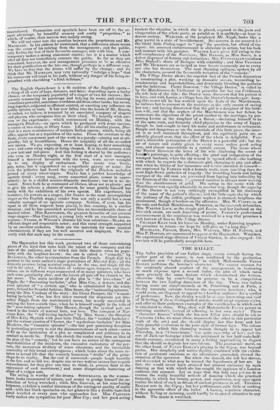THE BALLET.
THE ballet provision of our Italian stage, ceanty enough during the earlier part of the season, is now reinforced by the production of another new " ballet d'action," in which Mademoiselle FANNY Ei.sr.t:ri performs the heroine's character. We cannot account for the seemingly absurd conduct of the management, in bestowing so much expense upon a second ballet, the plot of which turns upon precisely the same feature which characterized the Ginota, otherwise than by concluding its purpose to be a competition between the two leading danseuses of the day. These two ballets has Mg come out simultaneously at St. Petersburg and at Paris, a riv thy naturally subsists between the respective heroines ; who, it would seem, are disposed to appeal to a I.oielon audience for a verdict of preference. Now, the rivalry would be :,t once interesting and void of ill feeling, if these distinguished artiste, would adopt separate styles, and offer to their audiences examples of the excellencies in which each is calculated to shine. Why, then, will Mademoiselle F.uN Y persist in imitating another's instead of adhering to her own style'? These " character dances," which she has now fallen into, should be left to TAci.lotir, (who, we must allow, transcends the other in this particular walk of the art,) and she should display her line form and her truly graceful evolutions in the pure style of former days. The odious disguise in which this charming woman thought fit to appear last Thursday, in a " Cracovieune," was quite unworthy of her ; and the sort of Jack-tar hornpipe which she performed in her half-male-half- female costume, occasioned in many a feeling approaching to disgust that she should so degrade her rare talents. The pantomimic merit, on the other hand, of FANNY ELsr.int's playing in the Gipy, was beyond praise. Her simplicity and native dignity, combined with the exhibi- tion of passionate emotions as the adventures proceeded, riveted the attention of the spectator. But when she danced, she left her throne, and descended to what may be termed the legerdemain of her art. In fact, she would never have attained her present eminence by such dancing as that with which she has sought the applause of a London audience this summer. Let us hope that this lady may yet see fit to resume the really beautiful iatkode of dancing which site practised formerly, in which her beauty, power, and expression, may once again realize the ideal of such as dream of ancient greatness in art. THERESA ELSLER acts in the Gipsy ; but her performance adds little or nothing to the agreeable effect of the ballet. A barren, repulsive character, without feeling or meaning, could hardly be rendered attractive in any hands. Time music is wretched.


























 Previous page
Previous page